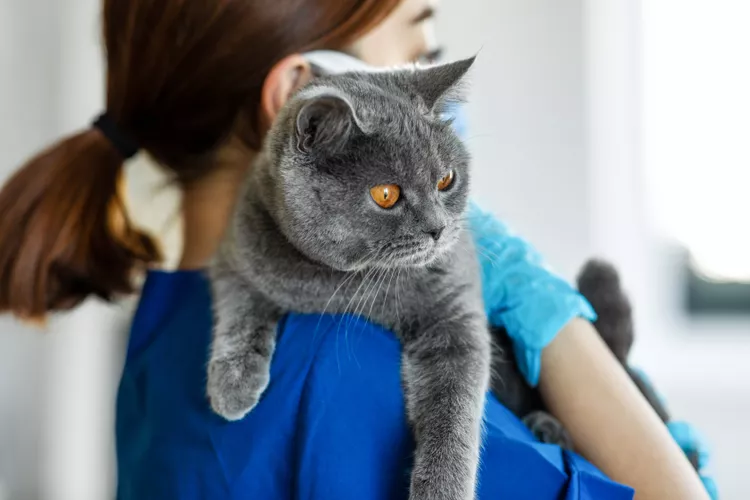9 Things to Include in a Cat First Aid Kit

While cats that spend any amount of time outside are more likely to need a first aid kit than those that are purely indoor cats, it's smart for any cat owner to be prepared with some basic supplies in a cat first aid kit. It's easy to compile and you never know when it might be needed, so it's something that shouldn't wait to be done until you find your cat needing one.
The following list is a good starting point for your cat's first aid kit, but your cat's individual habits, medications, and health needs may warrant additional items be added. If your cat is injured, take them to the vet for a thorough exam.
- 01 of 09
Gloves
If your cat has a wound, got sprayed by a skunk, has ants or fleas, or has some sort of chemicals on their fur or skin, you're going to want to put on some exam gloves before handling your cat. Exam gloves will protect you from whatever is on your cat including bacteria and blood-borne pathogens. These are inexpensive, single use items, so throw them away and restock your first aid kit after each use.
- 02 of 09
Electric Clippers
Things can get stuck in your cat's fur and fur can get into wounds. In either of these cases, you'll want some small electric clippers to shave the unwanted fur away. Sticky things, items tangled in long fur, diarrhea, bite wounds, lacerations, and more will benefit from some inexpensive clippers being in your first aid kit. Additionally, you're less likely to accidentally cut your cat with clippers than if you were to use scissors to cut off unwanted fur.
- 03 of 09
Emergency Phone Numbers
If your cat needs serious medical attention, your first aid kit can only do so much. To help your cat, you'll want to get them to a veterinarian as soon as possible or know who to call to get information. Having a list of emergency phone numbers ready that include your regular veterinarian, an emergency veterinarian, and a pet poison hotline helps to prevent you from wasting time searching and looking them up when an emergency happens.
- 04 of 09
Benadryl
Commonly referred to by the brand name Benadryl, liquid diphenhydramine is an antihistamine that should be in every cat first aid kit. The children's formulations come as a liquid and are much easier to administer to a cat than a pill, especially if your cat is small. The typical dose is 2 milligrams per kilogram of body mass or, to simplify, 1 milligram per pound of body weight by mouth every 8 hours. However, if you suspect your cat is having an allergic reaction, contact your veterinarian immediately.
Continue to 5 of 9 below - 05 of 09
Iodine
If your cat gets a cut or bite wound, cleaning it with povidone iodine can help clean it and prevent it from getting infected. Povidone iodine is also known by brand name Betadine and is a brownish-yellow liquid. It is mixed with water to create a diluted cleaning solution and can be applied directly to the open wound.
- 06 of 09
Bandaging Material
There are many kinds of bandaging materials that can be used on cats. Be sure to stock your first aid kit with cohesive bandages like Vet Wrap, non-stick guaze, bandage tape, and gauze squares.
- 07 of 09
Scissors
Scissors are a must have in first aid kits. Not only do they cut bandages to size but they can cut off string, rubber bands, hair ties, rope, and other items that your cat can get tangled in that could cause constricting wounds.
- 08 of 09
Styptic Powder
Torn nails can happen during a cat fight or if your cat gets its nails stuck in a carpet or blanket. These injuries are not only painful for your cat but they can also be messy if you can't control the bleeding. Styptic powder is a special powder that can help stop the bleeding and is an important part of any cat first aid kit.
Continue to 9 of 9 below - 09 of 09
Saline Eye Rinse
Saline eye rinse is a great dual-purpose cat first aid kit item. It can be used to flush debris from your cat's eyes as well as flush wounds.